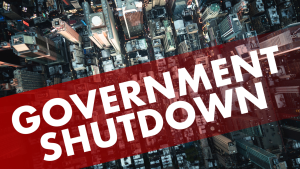Refinancing can feel like one of those big financial decisions that lingers in the back…
Government Shutdown 2025: What It Means for Mortgages
The federal government officially entered a shutdown on October 1, 2025 — now referred to as the Government Shutdown 2025 — after Congress failed to reach a budget agreement by the September 30 deadline. While the headlines are dominated by politics, the real-world effects extend into the housing and mortgage markets — impacting borrowers, lenders, and anyone currently in the process of buying or refinancing a home.
For ongoing updates, you can follow CNN’s live coverage of the shutdown, which tracks developments in real time.
While a government shutdown can sound alarming, not all programs stop completely. Many lenders are still processing loans, but certain programs and verifications that rely on federal operations are experiencing delays. To provide clarity, we’ve summarized guidance from some of our lenders, to help you understand what’s happening and how to keep your loan on track.
Conventional Loans: Mostly Unaffected 
Conventional loans backed by Fannie Mae and Freddie Mac continue to operate normally. These programs are funded through private capital markets rather than directly by the federal government, so processing, underwriting, and closings are largely unaffected.
Borrowers can proceed as usual, though lenders caution that some supporting verifications, like IRS transcripts or Social Security validations, may experience minor delays if staffing is reduced.
Key takeaway: Conventional loans remain a safe option during the shutdown.
FHA and VA Loans: Processing Continues, but Delays Are Possible
Programs backed by the FHA and the VA are still operational. Single-family FHA loans can continue to close, though some processes—like condo approvals—may take longer due to limited staff availability.
VA loans remain active as well, but appraisal scheduling and VA agent approvals could be delayed. Borrowers using VA benefits should anticipate slight adjustments to timelines.
Key takeaway: FHA and VA loans are open, but you may need patience if specific verifications or approvals are required.
USDA Loans: Most Impacted
The USDA Rural Development loan program is currently experiencing the most disruption. The USDA is not issuing new Conditional Commitments or loan guarantees during the shutdown.
- Loans with existing Conditional Commitments can still close.
- Loans waiting for new Conditional Commitments must pause until the government reopens.
This is especially relevant for buyers in rural or suburban areas relying on USDA programs for zero-down-payment financing. Lenders recommend planning ahead and staying in close contact with your loan officer to avoid unexpected delays.
Flood Insurance (NFIP) and Private Alternatives
The National Flood Insurance Program (NFIP) is paused during the shutdown, meaning FEMA cannot issue new policies or renew existing ones. Several of our lenders recommend using private flood insurance as an alternative.
Private flood insurance can meet all agency guidelines, allowing loans to move forward without waiting for NFIP reauthorization. Borrowers should note that switching from NFIP to a private policy may affect grandfathered rates or premiums in the future.
Borrowers Who Are Federal Employees
Those employed by the federal government or on federal contracts may face additional hurdles if furloughed during the shutdown. Here is some guidance from our lenders:
- Furloughed employees cannot use income for qualification until they return to work.
- Alternative verification methods, like recent direct deposit records, employer-validated W-2s, or other proof of active employment, may be used.
- Verbal verification of employment (VOE) can be waived if unavailable, provided attempts are documented.
Lenders emphasize flexibility during this period to help borrowers maintain their loan timelines wherever possible.
IRS and Social Security Verifications
IRS transcripts and Social Security number validations are typically required for mortgage underwriting. During the shutdown:
- IRS transcripts are still being processed, but some delays are expected due to staffing levels.
- Social Security verifications (SSA-89 forms) can still be completed electronically, but wet-signed forms may need to be processed post-shutdown as a post-closing condition.
Originators should plan ahead and document alternative income and employment verifications where needed.
How to Navigate the Shutdown
Despite these challenges, loans can still move forward. Here are steps borrowers should take to minimize disruptions:
- Stay in close contact with your loan officer. They can provide updates specific to your program and timeline.
- Consider alternative verification options. Use electronic SSA-89 forms, private flood insurance, and documented pay stubs or direct deposits.
- Plan for potential delays. USDA loans and some FHA processes may take longer than usual.
- Be proactive with documentation. Submit IRS forms, VOEs, and other required materials as early as possible to avoid bottlenecks.
Our lenders have issued guidance emphasizing that planning and flexibility are key to keeping loans on track.
Bottom Line
The government shutdown in 2025 is creating temporary hurdles in the mortgage industry, but it’s not halting home loans entirely. Conventional loans remain largely unaffected, FHA and VA loans are still operational, and USDA loans can close if commitments were already issued. Borrowers with federal employment or needing flood insurance may need to explore alternative solutions.
Staying informed and working closely with a trusted mortgage professional is the best way to navigate these uncertain times.
If you’re considering a home purchase or refinance during this period, it’s a good idea to request a quote from a loan officer today. Even with temporary delays, understanding your options now can help you plan effectively and avoid surprises.





